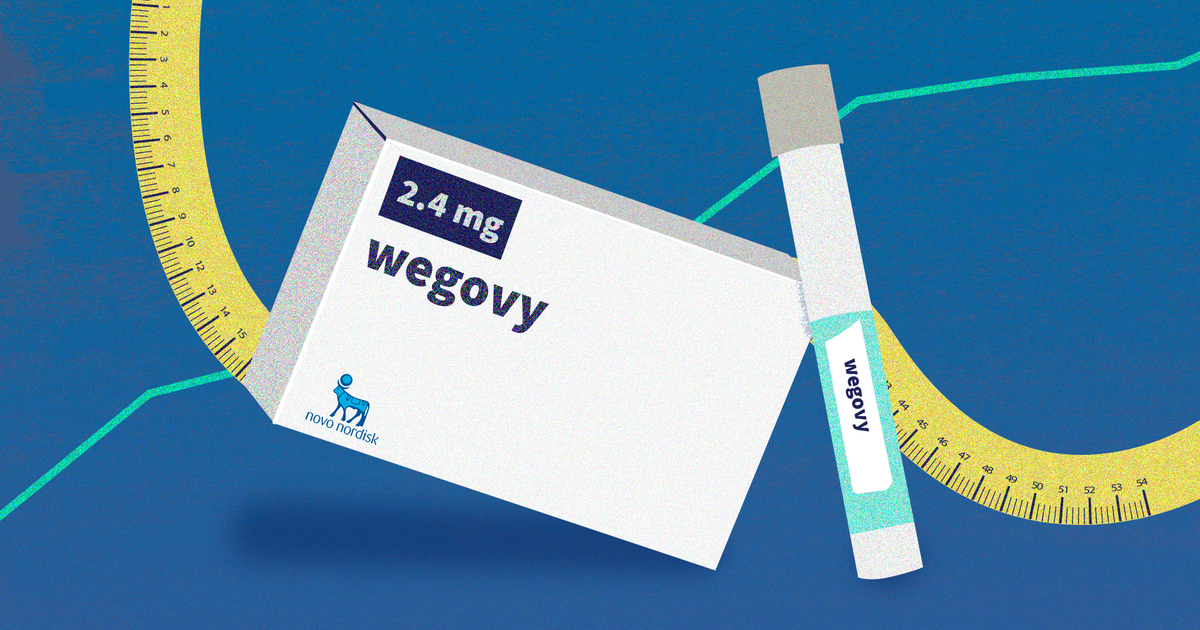By Aria Bendix and Berkeley Lovelace Jr. -
NBC News
During the two months that Carey Yazeed took Ozempic, the drug worked as intended.
Yazeed has type 2 diabetes, and the weekly injection lowered his blood sugar levels.
But she also gave him side effects that she found unbearable, including vomiting, fatigue, headaches, and stomach cramps.
Five weeks after starting the medication, Yazeed couldn't get up from the bathroom floor.
“I had thrown up so much that I didn't have the strength to get up and I was lying on the ground.
She couldn't even lift her head to throw up in the bowl.
It was so bad,” she recalled.
Carey Yazeed. Courtesy of Carey Yazeed
The severe effects Yazeed faced are unusual, but the experiences of people taking Ozempic and its sister drug, Wegovy, can vary greatly: from substantial weight loss and minimal discomfort at one end of the spectrum to extreme effects. in the other one.
NBC News, sister network of Noticias Telemundo, has interviewed ten people to learn about their experiences with these medications, both forms of semaglutide.
They are designed to mimic a hormone that signals the brain when a person is full and promotes the release of insulin, a hormone that prevents blood sugar from getting too high.
In turn, medications can lower blood sugar levels and suppress appetite.
[The revocation of the right to abortion impacts many women, but some are more affected than others]
Their popularity has skyrocketed in the last year, thanks in part to the attention of social media and billionaires like Elon Musk, who tout the slimming effects of these drugs.
Ozempic prescriptions tripled from 2021 to 2022, according to data from prescription drug discount company SingleCare, which has more than 5 million members.
Last year, high demand and global supply constraints led to shortages of the drugs.
The Food and Drug Administration (FDA) reported a stockout of Wegovy in March 2022, followed by another stockout of Ozempic in August.
Several people interviewed stated that the benefits they get from the drugs outweigh the side effects.
“I feel lighter when I move.
The clothes fit me so much better and more comfortable,” said Stacey Bollinger, an account manager in Maryland, who said she has lost 52 pounds (23 kilos) since she started taking Wegovy.
“Something as simple as bending over to tie my shoe is so much easier,” she said.
Stacey Bollinger.Courtesy of Stacey Bollinger
Some people said they felt fine on the medicines.
But Yazeed and a couple of others described side effects that made them stop taking it or wonder if they could keep taking it long-term.
The obesity medicine experts who prescribe Ozempic and Wegovy say these drugs can transform the lives and health of patients.
The weight-loss effects may allow patients to do activities they couldn't before, such as chasing after grandchildren or finding clothes in their size at regular stores.
Semaglutide can also treat health problems related to obesity and diabetes, such as increased risk of heart attack or stroke.
[Polio was eradicated thanks to vaccines even though fake Instagram posts say otherwise]
“By treating obesity, you can potentially treat more than 200 obesity- or weight-related diseases,” says Ania Jastreboff, MD, associate professor of medicine at Yale School of Medicine.
Jastreboff is on the scientific advisory board of Novo Nordisk, maker of Ozempic and Wegovy.
Stories of Drastic Weight Loss
The FDA approved Ozempic for people with type 2 diabetes in 2017, and then Wegovy—the same drug, which goes up to a higher dose—in 2021 for weight loss in adults with obesity or those who are overweight and have at least one weight-related health condition, such as high blood pressure or cholesterol.
Ozempic is not approved for weight loss, but doctors sometimes prescribe it for that purpose.
Most people who took Ozempic or Wegovy said it suppressed their hunger and reduced their cravings for unhealthy foods.
Bollinger and Randi Lee Harper, a Seattle computer programmer, reported losing more than 50 pounds.
Harper took Ozempic off-label to lose weight from May through November (she took a break when she moved to Washington state, but plans to start again).
She said she still enjoyed his favorite foods, like truffled macaroni and cheese and Sour Patch Kids, but the portions were smaller.
[Autism rates have tripled in the US. Is it more common or has it started to be better diagnosed?]
“You don't realize how much your life revolves around food when you're overweight until you're on a diet that allows you to take your mind off it, like with Ozempic,” Harper said.
For the most part, he added, he responded well to the medication, although he would sometimes burp if he ate too much, a fairly common side effect.
As for Bollinger, she said that in addition to losing weight, her average blood sugar levels have dropped to a point where she is no longer prediabetic.
A study of more than 1,000 people with type 2 diabetes found that semaglutide was more effective than insulin in lowering blood sugar.
The participants had not obtained results with other antidiabetic drugs, which they continued to take during the trial.
In another study of nearly 2,000 overweight or obese adults without diabetes, people who took semaglutide lost an average of 34 pounds (15 kilograms) in less than 16 weeks, compared with six pounds (2.7 kilograms) for those who received a placebo. .
Dr. C. Nicole Swiner, a family medicine physician in Durham, North Carolina, said she started taking Wegovy in 2021 after seeing how much it helped her patients.
She has lost 30 pounds (13 kilos) since then.
["There are more than 7,600 people with false nursing degrees": a criminal network that sold credentials is dismantled in Florida]
“Because I'm not starving, I can actually stop and make a smarter decision [instead of], 'Oh my gosh, I'm starving.
I'm going to get whatever's in the office kitchen,' which is usually junk food,” says Swiner.
C. Nicole Swiner. Chris Charles
At Wegovy, she adds, she eats less in general and has swapped sweets, such as cookies or muffins, for healthier alternatives, such as yogurt or fruit.
For Yazeed, losing weight was not the reason he started taking Ozempic, nor was it a goal.
But with the drug he had to force himself to eat and often he couldn't digest anything more than a protein shake in the morning.
On a good day, he too could tolerate a little chicken broth.
She lost 10 pounds (five kilos) in two months and went from a size 12 to a size 8 or 10.
Patients who stop taking the drugs often regain weight
As with many drugs, the effects of semaglutide wear off when patients stop taking it, so some people regain weight.
Experts consider Ozempic and Wegovy to be lifelong medications.
"Data from our clinical trials for Wegovy showed that, not unexpectedly, patients experience weight regain once they stop taking the medication," Novo Nordisk told NBC News in a statement.
“This supports the belief that obesity is a chronic disease that requires long-term treatment, just like hypertension or hypercholesterolemia, for which most patients are on long-term treatment,” the company added.
[Nearly 40% of Americans avoid going to the doctor for financial reasons. We explain how to save on healthcare]
Ebony Wiggins, who has type 2 diabetes, says she has regained about 15 pounds of the 25 she lost last year while taking Ozempic.
Artemis Bayandor, who lives in Naperville, Ill., says he weighs more now than he did when he took Wegovy: Within a month of coming off the medication, he regained the 30 pounds he had lost on the drug, he said, plus another 20 in the next six months.
“The first week I was fine, but the second week I had all the same cravings again, but worse,” Bayandor said.
Side effects lead to medication dropouts
Courtney Hamilton did not make it through a month of treatment with Ozempic, which her doctor prescribed off-label because she has type 1 diabetes, not type 2. Her nausea got so bad that she was forced to stop taking the medication.
The nausea was so severe that she could barely eat, and the foods she tolerated were not particularly healthy.
“Ironically, he forced me to eat starchy, carbohydrate-rich foods, like potatoes, because they are so bland.
I ate a lot of it and a lot of toast,” she explained.
You usually start with a low dose of Ozempic or Wegovy, and then increase it to reduce side effects.
Dr. Fatima Cody Stanford, an associate professor of medicine at Massachusetts General Hospital, says that some serious effects can be caused by increasing the dose too quickly.
[These are the signs to identify an overdose and save a life in time, according to an expert]
“If the patient says, 'My God, I'm sick.
I can't even go to work, I'm throwing up all day,' the dose probably isn't right for them,” Stanford said.
In clinical trials, 73% of adults taking the highest dose of Wegovy reported gastrointestinal problems.
The most frequent were nausea, diarrhoea, vomiting, constipation and stomach pain.
Some people have reported more serious, although rare, side effects such as pancreatitis and kidney failure.
Novo Nordisk advises that patients who experience nausea as a side effect should contact their doctor for guidance on how to treat it.
Jastreboff said he encourages his patients to eat smaller, more frequent meals, not to eat past the point of fullness, and to watch which foods exacerbate their symptoms.
He added that most of the side effects occur when the dose is increased and disappear when the maintenance phase is reached.
Megan Cornelius, who has been taking Ozempic for type 1 diabetes for several years, said she felt nauseated and fatigued at first, but these effects wore off over time.
“As long as I can keep taking it, I probably will,” Cornelius said.
Eric Joiner Jr. Courtesy of Eric Joiner Jr.
For Eric Joiner Jr., a former type 2 diabetic, Ozempic has done nothing beyond its intended effect: improving his kidney function, an off-label application.
Joiner developed chronic kidney disease as a result of diabetes.
According to him, the Ozempic has not produced any side effects or weight loss, but he acknowledges that this is not the case for everyone.
“At the end of the day, it is something very personal.
Your biology is different than mine,” she noted.












